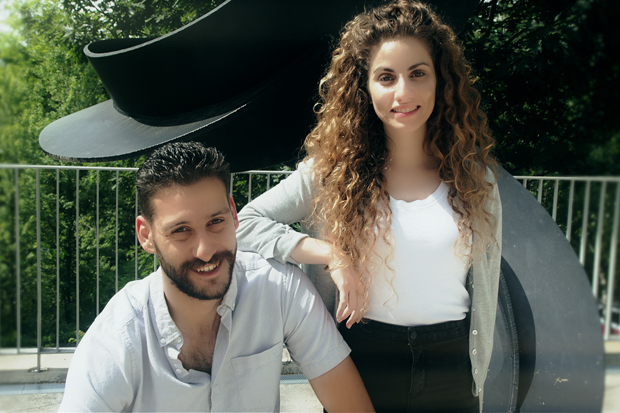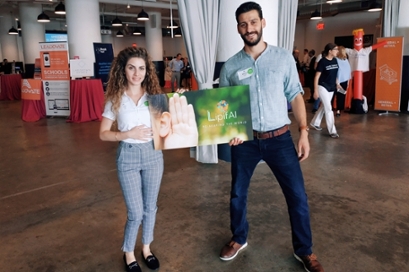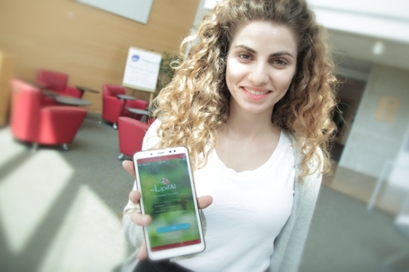These innovators are using tech to help translate speech for people with hearing loss
Fellows in this summer's Our Generation Speaks program are designing ventures that bring Israelis and Palestinians together through innovation
 Photo/Tarah Llewellyn
Photo/Tarah Llewellyn2019 Our Generation Speaks fellows Julie Dai, right, and Wasseem Ghrayeb take a short break from developing their venture LipifAI outside at the Heller School, where OGS is based.
Growing up in Haifa, Israel, Julie Dai attended an inclusive elementary school where students who are deaf and hard-of-hearing and students without hearing loss learned together. Dai does not have hearing difficulties, but the experience made her acutely aware of the challenges her classmates experienced, especially in noisy places.
Fast forward to the summer of 2019, and the 29-year-old – who has bachelor’s and masters’ degrees in computer science and
“When we brainstormed at the beginning of the program, I started out by thinking about problems I could solve that I and people around me experience on a daily basis. As we worked through the process, I thought about the communication struggle that people with hearing loss have in
Joining Dai – and 27 other fellows split evenly among Israelis and Palestinians – is Waseem Ghrayeb, a 30-
Together, the two are now working on LipifAI (pronounced lip-if-i), an online lip-reading technology, based on AI, to help deaf and hard-of-hearing people to communicate within their surroundings. Other technologies, including hearing aids, may not work effectively in noisy environments, and that’s where LipifAI comes in.

Dai, left, and Ghrayeb represented their venture LipifAI at the MassChallenge Showcase earlier this summer.
Simply put, explained Ghrayeb, “We turn speech into text,” but in a more sophisticated way than current speech-to-text
Such an app could be a game-changer for people with hearing loss, who would be able to understand conversations in noisy environments much better than before. It could be a social boon, particularly because people who are hard of hearing may avoid noisy environments because of the difficulties involved with interacting in them. In the U.S. alone, about 48 million people experience some degree of hearing loss.
"They [may] avoid restaurants, classrooms, and other noisy places. This is a very tough arena for them,” Ghrayeb said.
The pair have discussed their LipifAI with more than 20 people who are hard of hearing themselves, including an expert at the Massachusetts Eye and Ear Infirmary in Boston. “They said `you detected a specific and difficult problem,’ ” Dai said. “They told us `when you launch your product, we will use it.’ ”
Along with the other OGS Fellows, Ghrayeb and Dai have also received feedback and support from members of the OGS network. At the annual Venture Feedback Day in late July, each of the 2019 ventures pitched their ideas to a group including board members, mentors, coaches, donors, supporters and the growing group of OGS alumni.
“A lot of people followed up with ideas,” after their presentation, Ghrayeb said. “We felt high engagement from people.”
“We are very thankful for our mentors and for OGS staff who support and believe in us,” Dai said.

Dai shows an early version of the LipifAI app.
For the last few weeks of August, Dai and Ghrayeb will take LipifAI to the Massachusetts Institute of Technology, where they and the fellows launching two other ventures will work with faculty and students at MIT:
A central goal of OGS is to make long term connections between Israelis and Palestinians who may never have had the chance to meet if not for the program. “When Israelis and Palestinians work together, in the
Ghrayeb and Dai both believe in the opportunity for the ventures formed at OGS to become microcosms of
When the partners bring LipifAI back home, they’ll join a network of more than 100 alumni ready to help them overcome some of the obstacles their venture will inevitably face.
One of those alumni, Lobna Agbaria, returned to OGS two years ago as program director.
“As an OGS alumna, I’ve seen firsthand how powerful the connections formed through the program are, in the lives of alumni themselves and in the difference their ventures make in the region,” Agbaria said. “It’s so energizing to watch new fellows develop their ideas and their relationships with each other, and I’m excited to be able to support future fellows as they become part of the OGS community.”
Categories: Business, International Affairs, Science and Technology





